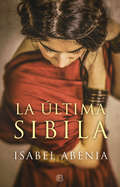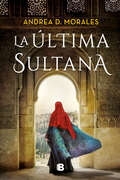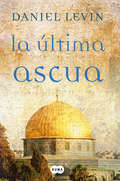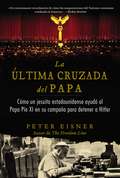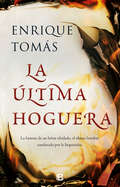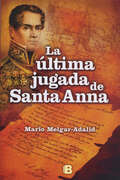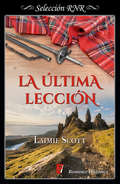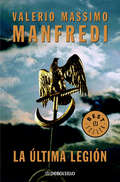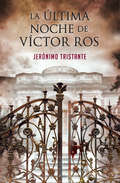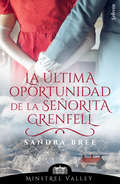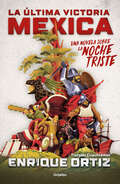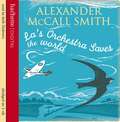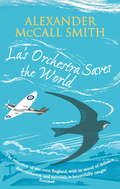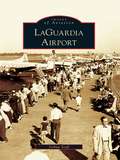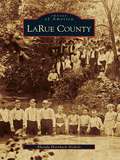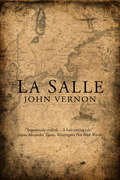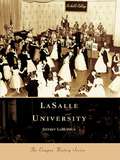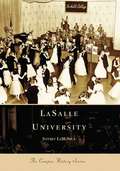- Table View
- List View
La última Sibila
by Isabel AbeniaUna hermosa novela de iniciación y misterio en el ocaso de la Grecia clásica. En Delfos, el centro del mundo griego, donde su oráculo predice el futuro de todos, la pequeña Berenice es llevada a la enigmática vivienda de la sibila para que comience su aprendizaje. En ese fascinante lugar, lejos de su madre, convivirá con otras sacerdotisas e irá adquiriendo conocimientos, pero no solamente de gramática o de la digna filosofía impartida por Plutarco, sino también de otro tipo mucho más profundo, si cabe: la propia Pitia, la gran pitonisa, la entrenará para que logre controlar sus emociones e incremente sus dones adivinatorios, y pueda sobrevivir en un universo femenino lleno de belleza y sabiduría, pero también de oscuras pasiones y envidias. Pronto se dará cuenta la joven de que, en ese particular escenario, están ocurriendo hechos de difícil explicación que desembocarán en muertes violentas que deberán ser resueltas. La última Sibila es el retrato de una niña que debe aprender a ser mujer en un ambiente tan atractivo como hostil, y a la vez el reflejo de una época en la que el cristianismo avanzaba implacable frente a la decadencia de la esplendorosa religión de los dioses del Olimpo.
La última Sibila
by Isabel AbeniaUna hermosa novela de iniciación y misterio en el ocaso de la Grecia clásica. En Delfos, el centro del mundo griego, donde su oráculo predice el futuro de todos, la pequeña Berenice es llevada a la enigmática vivienda de la sibila para que comience su aprendizaje. En ese fascinante lugar, lejos de su madre, convivirá con otras sacerdotisas e irá adquiriendo conocimientos, pero no solamente de gramática o de la digna filosofía impartida por Plutarco, sino también de otro tipo mucho más profundo, si cabe: la propia Pitia, la gran pitonisa, la entrenará para que logre controlar sus emociones e incremente sus dones adivinatorios, y pueda sobrevivir en un universo femenino lleno de belleza y sabiduría, pero también de oscuras pasiones y envidias. Pronto se dará cuenta la joven de que, en ese particular escenario, están ocurriendo hechos de difícil explicación que desembocarán en muertes violentas que deberán ser resueltas.La última Sibila es el retrato de una niña que debe aprender a ser mujer en un ambiente tan atractivo como hostil, y a la vez el reflejo de una época en la que el cristianismo avanzaba implacable frente a la decadencia de la esplendorosa religión de los dioses del Olimpo.
La última Sultana
by Andrea D. MoralesLA DESCONOCIDA HISTORIA DE LA ÚLTIMA GRAN MUJER DE AL-ÁNDALUS UNA NOVELA QUE NOS DESCUBRE EL PODER DE LAS SULTANASMorayma, hija del alcaide de Loja y primer mayordomo de la Alhambra, fue esposa de Boabdil, el último sultán del reino nazarí de Granada. Su vida, marcada por su belleza y por la tragedia, es la historia de quien nació sin estirpe y llegó a convertirse en la mujer más poderosa de la dinastía musulmana en uno de los periodos más convulsos. UN RELATO DE AMOR EN EL OCASO DE UNA ÉPOCAA través de las luces de una celosía, los ojos del sultán descubren a Morayma y, pocos días después, ambos se prometen aunque ella solo tiene quince años. Sin embargo la felicidad durará poco. El asedio de Granada por parte de Fernando el Católico va más allá del campo de batalla y las intrigas políticas llaman a la puerta del palacio. para caer en manos de ella y de otras mujeres. Será entonces cuando comience la desgracia que la alejará de su marido y de su primer hijo, del que deberá despedirse en favor de su reino. LA SANGRE Y LAS LÁGRIMAS NO SOLO SE DERRAMAN EN LAS BATALLASEscrita con un potente pulso narrativo y un preciso rigor histórico, esta novela retrata un aspecto de la Reconquista jamás contado. Andrea D. Morales recupera el desconocido personaje de Morayma para convertirla en la protagonista de este relato y mostrarnos los juegos de poder, amor y pasión que realmente llevan a ganar o a perder para siempre un reino.
La última ascua
by Levin, DanielAntiguos espías, conspiraciones modernas... Arqueología, política y religión se dan cita en La última ascua para intentar redefinir la propia Historia. ¿Realidad o ficción? El Imperio romano castigó la rebelión del pueblo judío con la destrucción del Templo de Jerusalén. En el botín figuraba la menorá, un enorme candelabro de siete brazos de oro macizo al que se atribuía un alto valor, símbolo más antiguo del judaísmo... Jonathan Marcus, abogado de compradores de antigüedades poco lícitos, ha de regresar a Roma, donde descubrió su pasión por la arqueología años atrás, para resolver el caso de la desaparición de una importante reliquia que lleva escondida 2.000 años. Sus investigaciones lo llevan del laberíntico subsuelo del Coliseo romano a los túneles de Jerusalén, que se remontan a tiempos bíblicos. En su búsqueda se encuentra frente a frente con Emili Travia, antigua compañera y conservadora de las Naciones Unidas, y juntos se darán cuenta de que no son los únicos que persiguen la reliquia... Bajo Roma y Jerusalén duermen innumerables yacimientos, auténticas ciudades subterráneas que permanecen ocultas. Con La última ascua volveremos a descubrir el Coliseo, las ruinas del Foro y la misma Roma con una mirada tremendamente sugerente y original. Daniel Levin nos transmite una pasión viva y actual por la antigüedad clásica. La trama, bien documentada pero sin olvidar que debe cautivarnos, se mueve entre la novela histórica y la detectivesca. Un mestizaje sumamente seductor.
La última correría del sabio Mutis: Una aventura en el campo de las palabras y los idiomas
by Gonzalo EspañaAcompaña a José Celestino Mutis, director de la Expedición Botánica a descubrir criaturas fantásticas y lugares exuberantes en medio de esta emocionante aventura, ideal para leer en familia "Es mi voluntad que en un plazo de máximo seis meses, esas gramáticas indias, que se olvidaron en el envío hecho a mi padre, me sean enviadas a mí para remitírselas al sabio Pallas. La amistad entre Rusia y España puede afectarse seriamente si no cumplimos con este encargo. Nuestro reino podría sufrir serios tropiezos". Con estas palabras del rey España, inicia la última aventura del sabio José Celestino Mutis, director de la Expedición Botánica que a sus 75 años emprende un viaje hacia lo desconocido para tratar de encontrar algo increíble: un lugar mágico donde viven las lenguas que ya nadie habla.
La última cruzada del Papa (The Pope's Last Crusade - Spanish Edition) (The Pope's Last Crusade - Spanish Edition): Cómo un jesuita estadounidense ayudó al
by Peter EisnerBasándose en recursos sin explotar, entrevistas exclusivas y nueva investigación de archivos, La última cruzada del Papa por Peter Eisner es un emocionante relato que trae a la luz el valiente esfuerzo del Papa Pío XI para condenar el nazismo y la política del Tercer Reich —una cruzada que podría haber cambiado el curso de la segunda guerra mundial.Un escandaloso relato de intriga y suspenso, ilustrado con dieciséis páginas de fotos de archivos, La última cruzada del Papa: cómo un jesuita estadounidense ayudó a la campaña del Papa Pío XI para detener a Hitler ilumina la atrevida pero poco conocida campaña de este líder religioso, una batalla espiritual y política que se descarriló por la muerte de Pío XI tan sólo unos meses más tarde. Peter Eisner revela cómo Pío XI tuvo la intención de rechazar inequívocamente el nazismo en uno de los pronunciamientos sin precedentes y progresistas jamás emitidos por el Vaticano, y cómo un grupo de clérigos conservadores conspiró para prevenirlo.Durante años, se han conocido sólo partes de esta historia. Eisner ofrece una nueva interpretación de este acontecimiento histórico y las figuras poderosas en su centro en una obra esencial que proporciona una visión seria y plantea cuestiones controversiales que afectan nuestra época actual.
La última hoguera
by Enrique TomásLa biografía del último hombre condenado a la hoguera por la Inquisición en España inspira esta novela de ficción histórica a partir de una vida real: la de un héroe injustamente olvidado por la historia. <P><P>¿Quién fue Cayetano Ripoll? <P>Cuando fue capturado por la Junta de la Fe ejercía de maestro de escuela en un arrabal de Valencia. Nacido en Solsona en 1778, pasó por Barcelona, participó en la guerra de la Independencia, fue hecho prisionero por las tropas napoleónicas, y permaneció en Francia hasta el fin de la guerra donde, en el exilio, bebió de la copa de la libertad, conoció a masones, leyó a Rousseau y a Diderot. <P>Regresó a España, como tantos prisioneros españoles, con la voluntad de defender los valores de libertad, igualdad y fraternidad, pero Fernando VII no estaba dispuesto a que la Constitución de Cádiz limitase su poder absoluto. Ripoll se asentó en Valencia. <P>El trienio liberal (1820-1823) fue una época de ebullición ideológica, política y literaria, en que surgió la prensa moderna amparada por la libertad de imprenta, y florecieron las tertulias y los cafés, en los que se trataba de lo divino y de lo humano. Discípulo y amigo del librero liberal Mariano Cabrerizo, se empeñó en levantar una escuela en la huerta de Valencia, porque para él la educación de los niños era la mejor forma de revolución.
La última jugada de Santa Anna
by Mario Melgar-AdalidLa historia en manos del poder, ambición e investigación. Un secreto que podría cambiar la historia de todo un país. Axkaná Miranada es un joven investigador mexicano que se encuentra en la Universidad de Texas. Se dedica a investigar acerca de los sombríos orígenes de la fortuna monetaria de Antonio López de Santa Anna. En la biblioteca de ese centro escolar, la Nettie Lee Benson, encuentra un documento que podría modificar la historia tanto de los Estados Unidos como la de México.Por otra parte, exiliado en La Habana, el general Antonio López de Santa Anna es capaz de mover los hilos políticos de México, tener una red de incondicionales que harán las gestiones que él les encargue, pactar decisiones importantes para el país, mantener el poder de decisión y, sobre todo, vender caro una promesa al presidente de los Estados Unidos.
La última lección
by Laimie Scott¿Puede la venganza unir a dos personas que lo han perdido todo tras la guerra? Laimie McDonald está radiante ante su inminente boda. La guerra ha terminado y por fin ella puede intentar ser feliz. Sin embargo, no puede presagiar lo que el destino le tiene preparado. Días antes de sus esponsales contempla la muerte de su prometido a manos de un oficial inglés en un duelo. Laimie promete que no descansará hasta obtener lo que ha jurado: venganza. Su maestro de armas le recomienda que viaje al norte en busca de Alexander Atholl para que la ayude a perfeccionar su estilo. Laimie descubre a un hombre abatido por las derrotas, solitario y huraño que ha perdido a su esposa e hijos. Lo que en un principio es un continuo rechazo por su parte, irá derivando en una relación profesor-alumna con consecuencias inesperadas para ambos. Hasta el punto de que Alexander decida abandonar la vida que ha llevado por algo que ni tan siquiera sabía que necesitaba.
La última legión
by Valerio Massimo ManfrediAnno Domini 476. El Imperio romano está llegando a su fin. Dividido en dos partes y devastado por las invasiones de los bárbaros, son ya pocos los territorios donde se mantiene el dominio de aquel Estado que gobernó el mundo durante tantos siglos. Rómulo Augusto, con trece años, es el emperador de Occidente tras haber sobrevivido a la aniquilación de su familia. El general germánico Wulfila lo hace prisionero y lo lleva a la isla de Capri junto con su preceptor Ambrosino. Sin embargo, no todos se han rendido a las fuerzas bárbaras: un grupo de valientes soldados leales a Roma le rescatan e inician un viaje a través de toda Europa, huyendo de sus enemigos, hasta llegar a los confines del imperio, al territorio de los druidas, Britania, donde encontrarán un destino inesperado.
La última legión
by Valerio Massimo ManfrediUn recorrido a través de la Europa de finales del siglo V para intentar salvar lo que queda del Imperio romano. Anno Domini 476. El Imperio romano está llegando a su fin. Dividido en dos partes y devastado por las invasiones de los bárbaros, son ya pocos los territorios donde se mantiene el dominio de aquel Estado que gobernó el mundo durante tantos siglos. Rómulo Augusto, con tres años, es el emperador de Occidente tras haber sobrevivido a la aniquilación de su familia. El general germánico Wulfila lo hace prisionero y lo lleva a la isla de Capri junto con su preceptor Ambrosino. Sin embargo, no todos se han rendido a las fuerzas bárbaras: un grupo de valientes soldados leales a Roma le rescatan e inician un viaje a través de toda Europa, huyendo de sus enemigos, hasta llegar a los confines del imperio, al territorio de los druidas, Britania, donde encontrarán un destino inesperado. La crítica ha dicho...«Un episodio histórico que sugiere lecturas contemporáneas.»ABC «De la espada de César a Excálibur, de Rávena hasta el muro de Adriano, el lector se apasionará con los avatares de la historia y del mito, con un imperio que se disuelve en las tinieblas del tiempo.»El Mundo «En una pirueta narrativa Manfredi enlaza la historia con la leyenda, demostrando cómo el final de un imperio pudo muy bien ser el principio de otro.»Qué leer
La última noche de Víctor Ros (Víctor Ros #Volumen 4)
by Jerónimo TristanteUna peligrosa asesina fugada. Un joven muerto en extrañas circunstancias. Una familia repleta de secretos. Un pasado oscuro y una traición. Por fin, un caso que pondrá a prueba el talento del detective más carismático e inteligente del siglo XIX, Víctor Ros. Suiza, 1882. Bárbara Miranda, una psicópata custodiada por el Sello de Brandenburgo, escapa de su celda y desaparece. Oviedo, un año después. Ramón Férez, primogénito de un acaudalado industrial, aparece asesinado delante de la verja de acceso a la Casa Férez. Para desesperación de las fuerzas del orden de la ciudad, no dejan de aparecer sospechosos del asesinato del joven, y el juez encargado del sumario, Agustín Casamajó, incapaz de encontrar al verdadero culpable, decide llamar a su gran amigo y famoso detective, Víctor Ros. Pero el caso no será fácil para él: tendrá que evitar las trampas que le colocarán en su camino las personas que menos espera, y se encontrará con un amor del pasado al que traicionó en su juventud. Víctor Ros, con la ayuda de su hijo adoptivo y de su perspicaz esposa, ¿encontrará al culpable y evitará más muertes? ¿Podrá salir airoso del caso más peligroso de su vida? O, por el contrario, ¿seremos testigos de su última noche? Lo que la prensa ha dicho sobre las novelas de Víctor Ros:«El escritor español combina con eficacia lo fantástico y la intriga policíaca.»Le Monde «Jerónimo Tristante no teme revelar el placer de la escritura y la pasión por los folletines de épocas pasadas.»Il Piccolo «Escribe con el estilo sereno de los clásicos de intriga y se ha convertido en un autor de referencia dentro del panorama de la narrativa española del siglo XXI.»La Verdad «Las andanzas de Ros harán las delicias de todos aquellos aficionados a las obras de Conan Doyle [...] Si alguien se pregunta qué podría surgir de mezclar las aventuras de Sherlock Holmes con el universo galdosiano, la respuesta la facilita Tristante con su entretenidísima obra.»El Faro de las Letras «Tristante pergeña sorprendentes novelas de misterio.»Público «Su nombre es sinónimo de éxito editorial.»Cambio 16 «Tristante está de enhorabuena gracias a un sugerente misterio con una combinación arriesgada y atrayente.»La Opinión de Murcia
La última oportunidad de la señorita Grenfell (Minstrel Valley #Volumen 10)
by Sandra BreeContinúa la rompedora serie de «Minstrel Valley», creada por catorce autoras de Selecta. Ambientada en la Inglaterra de la Regencia en un pequeño pueblo de Hertfordshire, descubrirás una historia llena de amor, aventuras y pasión. ¿Será capaz Edith Grenfell de dejarse llevar por el amor? Pronto podréis saber todo sobre esta apasionante historia... ¡Estad atentos! Sobre la serie:Minstrel Valley es un proyecto novedoso, rompedor y sorprendente. Catorce mujeres que crean una serie de novelas gracias a una minuciosa organización que ha llevado tiempo y esfuerzo, pero que tiene su recompensa materializada en estas quince novelas que vamos a disfrutar a lo largo de esta temporada. Esta labor de comunicación entre ellas, el apoyo mutuo, la coordinación y coherencia no hubiese sido posible sin nuestras queridas autoras, que hacen visible que con cariño, tiempo robado a sus momentos de ocio, de descanso y de familia, confianza, paciencia, esmero y talento, todo sea posible. Desde Selecta os invitamos a adentraros en Minstrel Valley y que disfrutéis, tanto como nosotros, de esta maravillosa serie de regencia. Prólogo de Nieves Hidalgo en Si me lo pide el corazón (Minstrel Valley 1):«Serán novelas divertidas, románticas, dulces, plenas de sentimiento, con personajes que os enamorarán; hasta con leyenda incluida. Historias paridas por la imaginación de unas autoras merecedoras de elogio, no ya solo por su capacidad para ilusionarnos, su disposición a compartir sino, sobre todo, por la manera encomiable de aplicarse al trabajo para ofreceros lo mejor de sí mismas.»
La última plegaria del dragón
by Enara de la PeñaUn silencio de treinta años, un secreto que marca dos historias de amor. ¿Puede el amor tener una segunda oportunidad en mitad de una guerra Yakuza? Una apasionante historia de amor, acción y sensualidad. Tokio. Era Taisho Nora abandona su vida en Londres para perseguir el sueño de enseñar en Japón. Aunque los fantasmas de su pasado continúan acosándola, lo último que se imagina es que su alumno será la clave en la lucha de las dos principales familias de la mafia japonesa. Entre garitos de apuestas y locales clandestinos, Ryu, un yakuza frío y solitario, pelea por recuperar el orgullo de los Maruyama. Hasta que se convierte en el guardaespaldas de un niño de cinco años y, casi sin darse cuenta, también de su irritante profesora. En un improvisado viaje de Nueva York a Tokio, Cole trata de averiguar quién es en realidad. Con suerte y la ayuda del hombre de hielo Kimitake, su atractivo traductor, comenzará una investigación que sacará a la luz el misterio de la desaparición de su madre. Dos historias de amor que se entrelazan en una ciudad gobernada por la tradición y la imparable fuerza del progreso. Cautivados por los cerezos en flor, cuatro vidas quedarán para siempre unidas en una aventura por los bajos fondos de Asakusa donde nada ni nadie es lo que parece.
La última victoria mexica: Una novela sobre la noche triste
by Enrique OrtizEL IMPERIO MEXICA TENDRÁ QUE DEMOSTRAR SU PODER Y GRANDEZA ANTES DE QUE SEA DEMASIADO TARDE… Tenochtitlan, 1520. El buen trato que Motecuhzoma ha concedido a los castellanos desde su llegada provoca sospechas entre los mexicas. Como gesto de confianza, el huey tlahtoani entrega varias doncellas de noble cuna a los forasteros para que la armonía siga reinando en el imperio. Una de ellas es Citlalli, joven aguerrida que deberá complacer y obedecer las órdenes de Gonzalo, capitán de rodeleros. Convencida de la importancia de su papel para mantener la paz, Citlalli faltará a la promesa que le hizo a su amado Cuauhtli, un destacado guerrero tenochca de origen plebeyo con quien planeaba huir para salvar su amor. Sin embargo, la paz es solo aparente y muy endeble. Cuando Pedro de Alvarado aprovecha la ausencia de Cortés para perpetrar una matanza en el Templo Mayor, cualquier posible alianza quedará anulada y los mexicas deberán luchar por mantener su hegemonía y su honor. Conflictos políticos, batallas épicas, intrigas y romance son los protagonistas de La última victoria mexica, una ambiciosa novela en la que el rigor histórico y la ficción se entrelazan para ofrecer uno de los relatos más apasionantes sobre los días previos a la Noche Triste.
La única puerta azul
by Joan FallonImagina que eres una niña de doce años; tienes una vida feliz y una familia que te ama, luego, poco a poco, tu vida se desintegra y te encuentras sola, a miles de kilómetros de tu hogar. Es septiembre de 1940, Maggie y sus jóvenes hermanos, Grace y Billy, están viviendo en el East End londinense con su madre. Su padre ha muerto en Dunquerque y su madre ingresa en el hospital para tener a su cuarto hijo, dejando a los niños al cuidado de una vecina. En uno de los peores ataques aéreos de la guerra su casa es destrozada y su vecina muere. Desconcertados y asustados, los chicos vagan por las calles hasta que son acogidos por unas monjas. Pero sus problemas no han terminado; nadie puede dar con su madre y, dados por huérfanos, son enviados como niños migrantes a Australia. La novela narra sus aventuras en su nuevo país, la nostalgia, el dolor de su corazón cuando Billy es separado de sus hermanas y la soledad de su vida en un frío e insensible orfanato. Finalmente, los niños rehacen sus vidas separados, pero Maggie todavía está convencida de que su madre está viva y una vez es lo suficientemente mayor comienza a buscarla. Esta novela está basada en las experiencias de gente real y refleja la actitud de la época hacia los niños de la migración durante y después de la Segunda Guerra Mundial.
La's Orchestra Saves The World
by Alexander McCall SmithWith a failed marriage behnd her, La -- short for Lavender -- moves to the Suffolk countryside to nurse her broken heart on the eve of the Second World War. Lonely and at a loss, a friend encourages her to bring the villagers and the men from the local airbase together by forming an amateur orchestra. One of her musician recruits is Feliks, a handsome and enigmatic Polish refugee. A friendship begins to blossom between the two, and La finds her feelings stirring to life again.Poignant, tender and inspiring, La's Orchestra Saves the World celebrates the power of love and friendship in the collective tragedy of war, as well as the extraordinary healing power of music.
La's Orchestra Saves The World: A Novel
by Alexander McCall SmithWith a failed marriage behnd her, La -- short for Lavender -- moves to the Suffolk countryside to nurse her broken heart on the eve of the Second World War. Lonely and at a loss, a friend encourages her to bring the villagers and the men from the local airbase together by forming an amateur orchestra. One of her musician recruits is Feliks, a handsome and enigmatic Polish refugee. A friendship begins to blossom between the two, and La finds her feelings stirring to life again.Poignant, tender and inspiring, La's Orchestra Saves the World celebrates the power of love and friendship in the collective tragedy of war, as well as the extraordinary healing power of music.
La-5/7 vs Fw 190
by Jim Laurier Dmitriy KhazanovSoviet fighter aviation suffered terribly at the hands of the Jagdwaffe in the first year of the war in the east, and with the arrival of JG 51 and its Fw 190s on the Stalingrad Front in September 1942 things only got worse for the hard-pressed Red Army Air Force pilots. However, help was on its way in the form of the re-engined LaGG-3 fighter, which was fitted with a powerful air-cooled M-82 radial engine. Designated the La-5, the new fighter was capable of withstanding more punishment than the fragile LaGG-3, and it was also appreciably faster and had a greater rate of climb. It was more of a handful to fly, however, but the new generation of better trained pilots who were led into combat by the survivors of 1941-42 quickly found the La-5 (and, later, the improved La-7) very much to their liking. Arriving in the frontline in August 1942, the new Lavochkin fighters soon found themselves pitted into action on the Central Sector against the equally new Fw 190As of JG 51. The first clashes took place in November of that year, and from then on the Focke-Wulf fighter would regularly clash with its counterpart from Lavochkin.From the Trade Paperback edition.
LaGG & Lavochkin Aces of World War 2
by George MellingerThis book examines the LaGG family of fighters, that were amongst the first modern piston-engined interceptors made available to the Red Air Forces in early 1941and proved far better fighters than their radial-engined predecessors. Despite technical maladies and political interference from Moscow, the LaGG-3 matured into an effective fighter when flown to its strengths at low level. Many early Soviet aces were weaned on the LaGG-3, and if they survived the early massacres of 1941-42, they went on to fly the Lavochkin family of fighters. Indeed, the Lavochkin La-3, -5 and -7 were the fighters of choice for Heroes of the Soviet Union such as Ivan Kozhedub, who claimed 62 kills.
LaGuardia Airport (Images of Aviation)
by Joshua StoffConstructed closer to Manhattan than the commercially unsuccessful Floyd Bennett Field, LaGuardia Airport was conceived in the mid-1930s as New York City mayor Fiorello LaGuardia realized the need for a great airport for one of the world's great cities. Originally known as New York Municipal Airport, the popular airport soon had its name changed to recognize LaGuardia's enormous contribution to the project. At the time of its opening in 1939, it was the largest and most advanced commercial airport in the world with terminals considered art deco masterpieces. Although a very large airport for the era in which it was built, by the late 1940s it was the world's busiest airport and clearly too small for the increasing amount of air traffic. Through the years its runways were lengthened and facilities were improved to handle larger and faster aircraft. Still one of America's busiest airports, LaGuardia has witnessed the steady progress of American commercial aviation, from flying boats to jetliners.
LaRue County (Images of America)
by Rhonda Hornback NicholsIn 1843, LaRue County was named after John LaRue, an early settler in the area. Hodgenville, the county's largest town, was established in 1818 and later became the seat in 1843. LaRue County is best known as the birthplace and childhood home of Abraham Lincoln; he was born on February 12, 1809, at the Sinking Spring Farm. In 1909, in honor of Lincoln's centennial birthday, New York sculptor Adolph A. Weinmann created a life-size statue of the 16th president, which still stands in the Hodgenville square. Today the Abraham Lincoln Birthplace National Historic Site and Abraham Lincoln Boyhood Home at Knob Creek are popular tourist attractions. From a national icon to the local farmer, generations of people have called LaRue County home and have nurtured a strong sense of community.
LaSalle
by John VernonThe Sieur de La Salle's story begins in 1682, when he sets out with twenty-two Frenchmen, eighteen Indians, and his always-grumbling, epileptic cartographer, Pierre Goupil, to chart the length of the Mississippi River. In the course of this breathtaking novel, we see early America as seldom before.<P><P> This is a world as foreign to us as any, for, as John Vernon points out, “the map of North America, so etched in our imaginations, with the great furrow of the Mississippi River running down the center of it, did not yet exist for these colonists.” For them, North America is a vivid and dangerous dream of hardship, madness, and poetry. <P> Not simply an adventure story, La Salle is an epistolary novel in the best eighteenth-century tradition. John Vernon has ingeniously molded historical facts into a set of diary entries by La Salle and Goupil. In their often conflicting and always vigorous styles, the two describe their journey into the wilderness and a world in which the reason and religion of Europe have no place. <P> First published in 1986, La Salle is a classic of American historical fiction
LaSalle University
by Jeffrey LamonicaThe history of LaSalle University, located in Philadelphia, dates back nearly 150 years. The institution has occupied various locations throughout the city, including the Bouvier Family Mansion from 1886 to 1930. Original photographs of Archbishop James Wood and the Christian Brothers, who founded LaSalle College in 1863, are among the featured images portraying the personalities who shaped LaSalle. Tom Gola and the 1954 NCAA men's basketball championship team and Tom Curley, cocreator of USA Today, are among LaSalle's star athletes and prominent graduates. LaSalle University places the school's story into the context of the history of the United States by presenting photographs that capture the essence of World War II, the cold war, the 1960s, and other key moments in American history.
LaSalle University (The Campus History Series)
by Jeffrey LamonicaThe history of LaSalle University, located in Philadelphia, dates back nearly 150 years. The institution has occupied various locations throughout the city, including the Bouvier Family Mansion from 1886 to 1930. Original photographs of Archbishop James Wood and the Christian Brothers, who founded LaSalle College in 1863, are among the featured images portraying the personalities who shaped LaSalle. Tom Gola and the 1954 NCAA men's basketball championship team and Tom Curley, cocreator of USA Today, are among LaSalle's star athletes and prominent graduates. LaSalle University places the school's story into the context of the history of the United States by presenting photographs that capture the essence of World War II, the cold war, the 1960s, and other key moments in American history.
